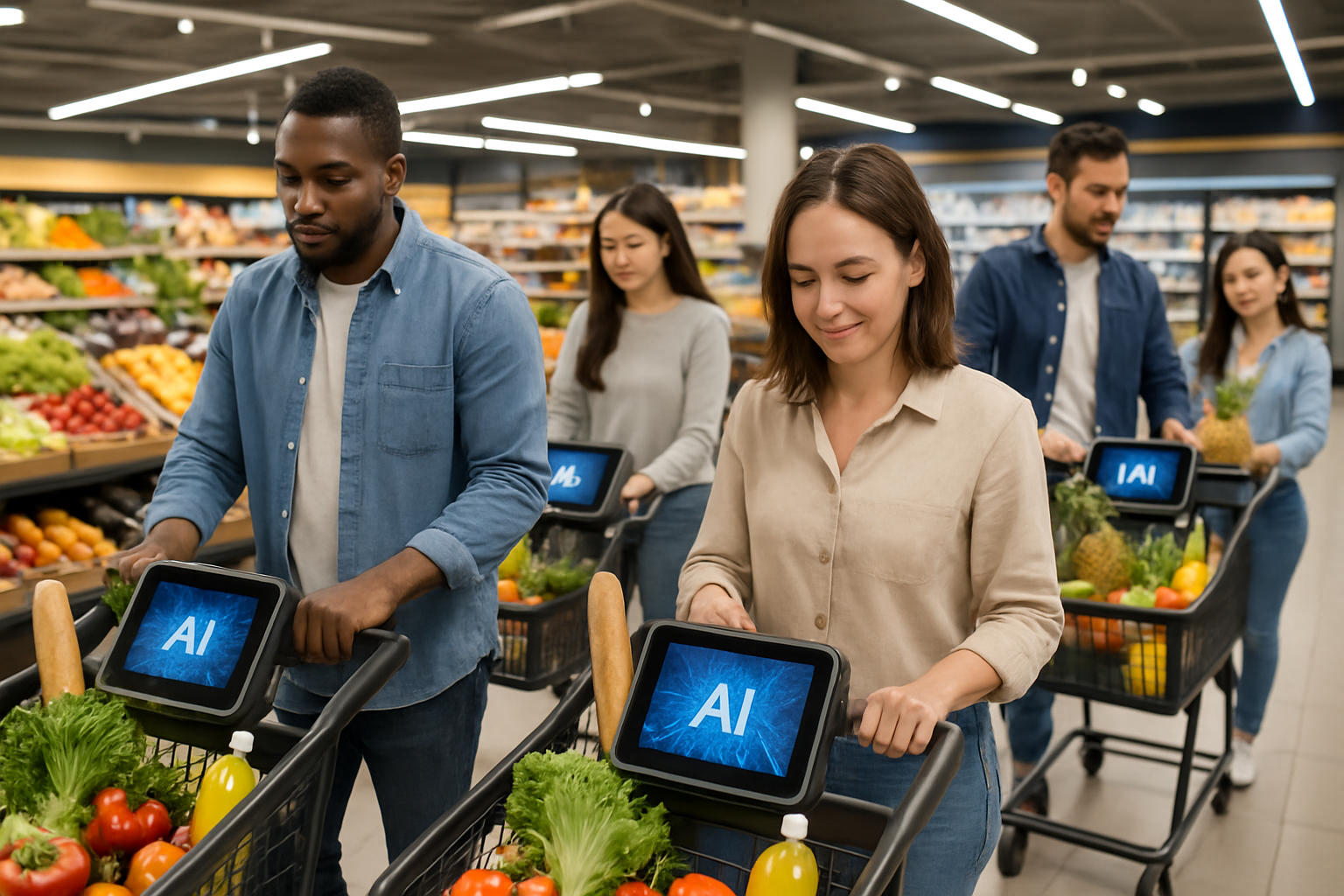Quick Take
- Waitrose launches UK’s first AI smart trolley trial at Bracknell store using Israeli Shopic technology
- System saves shoppers 8 minutes vs traditional tills, 2.5 minutes vs self-checkout through automated scanning
- Global smart cart market surges 27.6% to $2.19B by 2025 as retailers embrace computer vision
- UK AI retail market projected to reach $3.55B by 2032 with 31.09% annual growth
- Trial positions John Lewis-owned chain ahead in competitive £200B UK grocery sector
Waitrose has become the first UK retailer to trial AI-powered smart trolleys, working with Israeli company Shopic to test computer vision technology that automatically recognizes products as customers shop at their Bracknell location. The system turns ordinary shopping carts into smart data centers using handlebar-mounted devices with cameras and iPad-style screens.
The technology goes beyond traditional scan-and-go devices by automatically tracking every item customers add or remove from their trolleys. Shopic says their system cuts shopping time significantly—8 minutes compared to regular checkout lines and 2.5 minutes versus self-service options. Rear-facing cameras verify items placed in trolleys, helping reduce theft through better security monitoring.
Revolutionary Shopping Technology
The smart trolley technology marks a major shift from manual scanning to completely automated product identification. These efficiency gains mean higher customer throughput and lower staffing costs for retailers—particularly important given the UK’s post-Brexit labor shortages in the grocery sector.
Shoppers still need to weigh loose produce at aisle scales and select bakery items through the device screens, showing where the technology still has limits. The system keeps traditional checkout lanes available for customers who prefer human service during this ‘very small scale’ testing phase.
Explosive Market Growth Signals Transformation
The global smart shopping cart market shows incredible growth, expected to jump from $1.72 billion in 2024 to $2.19 billion by 2025—a striking 27.6% yearly increase. This growth reflects how AI reduces shopping cart abandonment while increasing average purchase amounts across different retail types.
Other retailers are already seeing strong results with similar AI systems. Tesco and Walmart have improved inventory accuracy by up to 95% using AI-powered stock management. The UK grocery market itself is forecast to grow by $56.2 billion from 2025 to 2029, largely thanks to AI-driven personalization and supply chain improvements.
Sainsbury’s and Morrisons use AI for instant shelf restocking, while discount chains Aldi and Lidl deploy AI-powered loyalty apps to capture 19.2% market share. This competitive race highlights how urgent it is for traditional retailers to adopt AI innovation.
Operational Intelligence Beyond Checkout
Smart trolleys offer more than just faster checkout—they provide valuable customer behavior data. Retailers can track how long customers spend in different areas, their shopping paths, and which shelves they interact with most. This information helps optimize store layouts and predict demand better. The system also enables location-based promotions, creating new income opportunities through targeted advertising.
Retail AI tools typically pay for themselves within 12-18 months, making them smart investments even during uncertain economic times. In fashion retail, AI solutions have boosted conversions by 332%, suggesting similar potential for grocery stores.
The technology helps tackle post-Brexit supply chain issues through better demand forecasting. Levi Strauss cut excess inventory by 30% using comparable systems, showing the precision capabilities that UK grocers need as they face inflation and supply uncertainties.
Strategic Market Positioning
Waitrose’s strategy shows careful market testing while keeping operational options open. UK businesses are embracing AI quickly—small and medium enterprise AI adoption rose from 25% in 2022 to 45% now, showing growing confidence in automated systems.
But real-time customer tracking raises privacy questions that need strong data protection measures. The trial represents smart positioning in a fast-changing market rather than just showing off new technology for the John Lewis-owned retailer.
Investment Implications for Leaders
The UK’s £3.5 billion AI retail opportunity by 2032 will likely benefit early adopters who excel at customer data analysis and operational efficiency. Companies must weigh significant upfront investments against long-term strategic benefits and competitive advantages.
As inflation and labor shortages strain traditional retail models, AI provides paths to operational strength. The trial positions Waitrose as an innovation leader while generating insights for scaling across their 331 UK stores.
When combined with shelf-monitoring cameras and supply chain optimization tools, smart trolleys represent complete AI integration that creates connected retail systems responding dynamically to customer needs and market changes. Waitrose’s smart trolley initiative represents a turning point for UK grocery retail, where AI moves from nice-to-have feature to competitive requirement.




